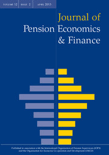
Journal of Pension Economics & Finance
Scope & Guideline
Shaping Financial Security Through Research
Introduction
Aims and Scopes
- Pension System Analysis:
The journal emphasizes in-depth studies of various pension systems worldwide, examining their structure, funding mechanisms, and sustainability. This includes evaluations of defined benefit and defined contribution plans, as well as hybrid systems. - Retirement Income Strategies:
Research on effective retirement income strategies is a core focus, including topics like annuitization, decumulation strategies, and the impact of investment choices on retirement outcomes. - Behavioral Economics in Pension Choices:
The journal explores the psychological and behavioral factors influencing individual and institutional decisions regarding pension savings, investments, and retirement planning. - Policy and Reform Implications:
A significant aim is to analyze the implications of pension policy reforms and their socio-economic impacts, including equity, sustainability, and responsiveness to demographic changes. - International Perspectives on Pension Issues:
The journal encourages comparative studies that highlight the differences and similarities in pension systems across countries, fostering a global understanding of pension economics.
Trending and Emerging
- Impact of Technology on Pension Management:
There is a growing trend towards examining how technology, such as online pension dashboards and digital tools, affects pension knowledge, decision-making, and overall retirement preparedness. - Behavioral Insights in Retirement Planning:
Research exploring the psychological aspects of retirement planning and how cognitive biases affect financial decisions is gaining traction, highlighting the need for better financial literacy and education. - Sustainability and Environmental Considerations in Pension Funds:
Emerging themes include the integration of sustainability into pension fund investment strategies, reflecting a broader societal shift towards responsible investing and consideration of environmental, social, and governance (ESG) factors. - Demographic Changes and Retirement Dynamics:
As populations age, there is an increasing focus on how demographic shifts impact retirement decisions, labor market participation, and policy responses, particularly in the context of older workers. - Global Pension Reforms and Comparisons:
An uptick in comparative studies of pension reforms across different countries is evident, driven by the need to learn from diverse approaches to common challenges in pension economics.
Declining or Waning
- Traditional Pension Fund Performance:
Research focused primarily on the historical performance metrics of pension funds has seen a decline as the field shifts towards more dynamic analyses, such as the impact of behavioral factors and market changes. - Static Retirement Age Policies:
Studies centered on fixed retirement age policies are becoming less common, as the focus has shifted towards flexible retirement solutions and the implications of longevity on retirement planning. - Pension Fund Governance:
While governance remains important, the specific focus on traditional governance structures is waning as new models and frameworks emerge, emphasizing transparency and stakeholder engagement.
Similar Journals
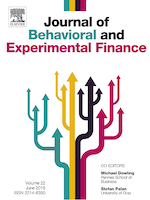
Journal of Behavioral and Experimental Finance
Transforming Finance with Experimental InsightsJournal of Behavioral and Experimental Finance, published by Elsevier, stands as a premier outlet for groundbreaking research in the realm of finance, particularly focusing on the psychological and behavioral factors that influence financial decision-making. With an ISSN of 2214-6350 and an E-ISSN of 2214-6369, this journal has established itself within the top tier, achieving a Q1 ranking in Finance for 2023, and is currently positioned 10th out of 317 journals in the Scopus category of Economics, Econometrics and Finance, demonstrating a remarkable 97th percentile ranking. Aiming to bridge theoretical advancements with practical applications, the journal encourages submissions that explore innovative methodologies and empirical studies, offering valuable insights for academics, practitioners, and students alike. As a vital resource for those interested in the confluence of psychology and finance, the Journal of Behavioral and Experimental Finance is pivotal in shaping the future of financial research and practice.

Borsa Istanbul Review
Unlocking insights into emerging market dynamics.Borsa Istanbul Review, published by ELSEVIER, is a premier open-access journal making significant contributions to the field of Economics and Finance since its inception in 2013. With a commendable Q1 rating in both categories according to the 2023 metrics, this journal ranks impressively at #36 out of 317 in Finance and #91 out of 716 in Economics and Econometrics on Scopus, placing it in the top tier of international academic publications. The journal not only provides a platform for rigorous and innovative research but also aims to foster a deeper understanding of the evolving economic landscape, particularly within the frameworks of emerging markets. Catering to researchers, professionals, and students alike, Borsa Istanbul Review is dedicated to delivering high-quality, peer-reviewed scholarly articles that are freely accessible to enhance global research collaboration. It serves as an essential resource for anyone looking to stay abreast of cutting-edge developments in the financial and economic sectors.

Journal of Economics Finance and Administrative Science
Exploring trends that shape economic landscapes.Journal of Economics Finance and Administrative Science, published by Emerald Group Publishing Ltd, is a premier open-access journal that has been at the forefront of advancing knowledge since its inception in 2012. With an ISSN of 2077-1886 and E-ISSN of 2218-0648, the journal caters to the disciplines of economics, finance, and administrative sciences within an international context, specifically observing trends from Peru and beyond. This highly regarded journal holds a Q1 ranking in Economics, Econometrics and Finance for 2023, landing it in the top percentile among its peers, with an impressive Scopus rank of #33 out of 288 in general economics. Since transitioning to open access in 2017, the journal has democratized access to cutting-edge research, making it indispensable for researchers, professionals, and students alike. By publishing rigorous empirical studies, comprehensive reviews, and innovative theoretical contributions, the Journal of Economics Finance and Administrative Science aims to facilitate knowledge exchange and foster collaboration within the global academic community.
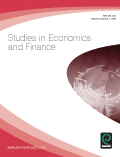
Studies in Economics and Finance
Empowering research that shapes economic policies.Studies in Economics and Finance is a distinguished journal published by Emerald Group Publishing Ltd, based in the United Kingdom. With an ISSN of 1086-7376 and an E-ISSN of 1755-6791, this journal has been a significant contributor to the fields of economics, econometrics, and finance since its inception, with coverage ranging from 1977 to the present. Ranked in the second quartile (Q2) for 2023 in its relevant categories, it holds a reputable position within the 83rd percentile in the general economics, econometrics, and finance fields according to Scopus rankings. This journal aims to disseminate cutting-edge research that addresses key issues and emerging trends in the economic and financial landscapes, fostering dialogue among scholars, practitioners, and policymakers. Although it does not operate under an Open Access model, Studies in Economics and Finance continues to be an essential resource for advancing knowledge and providing insights that are crucial for understanding complex economic behaviors and financial systems.
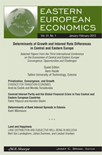
EASTERN EUROPEAN ECONOMICS
Empowering Research on Eastern Europe's Economic LandscapeEASTERN EUROPEAN ECONOMICS is a prominent journal published by Routledge Journals, Taylor & Francis Ltd, dedicated to advancing the field of economics with a focused lens on Eastern European contexts. With an ISSN of 0012-8775 and an E-ISSN of 1557-9298, this journal serves as a vital resource for researchers, professionals, and students interested in the economic dynamics of Eastern Europe. Its publications since 1977, with convergence years spanning from 1982 and ongoing through 2024, illustrate its longstanding commitment to the exploration of economic theory, policy, and practice within the region. Recognized as a Q3 category journal in Economics and Econometrics for 2023 and ranked #402 out of 716 in the Scopus database, it provides a platform for scholarly articles that contribute to the understanding and development of economic strategies in Eastern Europe. While currently not open access, the journal caters to a diverse audience seeking rigorous empirical and theoretical research that addresses the complexities and opportunities within Eastern European economies.
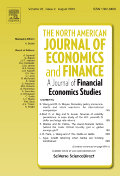
North American Journal of Economics and Finance
Elevating scholarship in economic and financial research.The North American Journal of Economics and Finance is a premier academic journal published by Elsevier Science Inc. since 1992, dedicated to advancing the field of economics and finance through rigorous research and scholarship. With an impressive impact factor and recognition in the Q2 category for Economics and Econometrics and Q1 for Finance as of 2023, this journal holds a significant position in the academic community, ranked #41 out of 317 in Finance and #100 out of 716 in Economics. The journal features high-quality, peer-reviewed articles that cover a broad range of topics, from theoretical frameworks to empirical analyses and practical applications. Though not an open-access platform, the journal provides valuable insights for researchers, practitioners, and students alike, promoting knowledge dissemination in the dynamic landscape of economic and financial studies. With its commitment to excellence, the North American Journal of Economics and Finance serves as an essential resource for those seeking to deepen their understanding of contemporary issues in these critical fields.

Ekonomicheskaya politika
Exploring innovative solutions for contemporary economic challenges.Ekonomicheskaya politika, published by EKONOMICESKAA POLITIKA, is a premier journal dedicated to advancing the fields of economics, finance, and the sociopolitical dimensions impacting economic policies, particularly within the Russian context. Established in 2013, it plays a crucial role in addressing contemporary economic challenges and contributing to scholarly discourse. The journal is indexed in Scopus, demonstrating its relevance and scholarly impact, with its rankings and quartiles reflecting a strong commitment to quality research. Although it operates under a traditional access model, its comprehensive analyses and thought-provoking articles are essential resources for researchers, professionals, and students alike, fostering a deeper understanding of economic trends and policy implications in both global and local arenas. With its convergence of interdisciplinary approaches from economics, political science, and sociology, Ekonomicheskaya politika not only serves as a valuable academic platform but also as a critical reference point for policymakers and practitioners interested in the evolving landscape of economic policy.
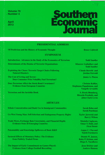
SOUTHERN ECONOMIC JOURNAL
Exploring the Depths of Economics and Econometrics.SOUTHERN ECONOMIC JOURNAL, published by Wiley, serves as a premier platform for scholarly research in the fields of economics and econometrics. With an impressive track record spanning from 1976 to 2024, this journal is esteemed for its contributions to economic theory, empirical research, and policy discussions, making it a critical resource for researchers, professionals, and students alike. Holding a commendable Q2 ranking in its category for 2023, it highlights its influence and standing in the field, ranking #291 out of 716 in Scopus within Economics and Econometrics, placing it in the 59th percentile. While it operates on a subscription model, the journal ensures broad accessibility to its content, fostering academic collaboration and knowledge dissemination. For those striving for a deeper understanding of contemporary economic issues, the SOUTHERN ECONOMIC JOURNAL is a vital resource that enriches the discourse in the economic community.

Climate Change Economics
Shaping Sustainable Policies Through Economic ResearchClimate Change Economics, published by World Scientific Publishing Co Pte Ltd, is a leading interdisciplinary journal dedicated to advancing research on the economic aspects of climate change. With an impressive impact factor reflected in its Q2 ranking in both the Economics and Econometrics and Global and Planetary Change categories, as well as a Q1 status in Management, Monitoring, Policy and Law, this journal serves as a vital platform for researchers, policymakers, and practitioners alike. The journal encompasses a wide range of topics, from economic modelling of climate impact to innovative policy responses and sustainable management practices, providing critical insights essential for effective decision-making. Operating from Singapore, Climate Change Economics emphasizes open dialogue and evidence-based solutions to confront one of the most pressing challenges of our time, fostering a cross-disciplinary approach to climate-related economic research. Researchers, professionals, and students are encouraged to explore the diverse array of articles that contribute to the evolving discourse on sustainable economics.

JOURNAL OF REAL ESTATE FINANCE AND ECONOMICS
Exploring innovative research in the dynamics of real estate finance.JOURNAL OF REAL ESTATE FINANCE AND ECONOMICS, published by Springer, stands as a vital resource in the field of real estate economics, bringing together innovative research, theoretical frameworks, and empirical studies since its inception in 1988. With an evolving focus that spans various aspects of real estate finance and urban economic dynamics, this journal occupies a prominent position in the academic landscape, reflected in its Q2 ranking in Accounting, Economics and Econometrics, and Finance, alongside a prestigious Q1 status in Urban Studies. Boasting a significant international readership, this journal serves as a key platform for researchers and industry professionals to share groundbreaking findings, thus facilitating knowledge exchange in a rapidly changing economic environment. While the journal currently operates under a subscription model, it remains committed to advancing scholarship with a high impact factor that underscores its relevance and contributions to the ongoing discourse in real estate finance and economics.